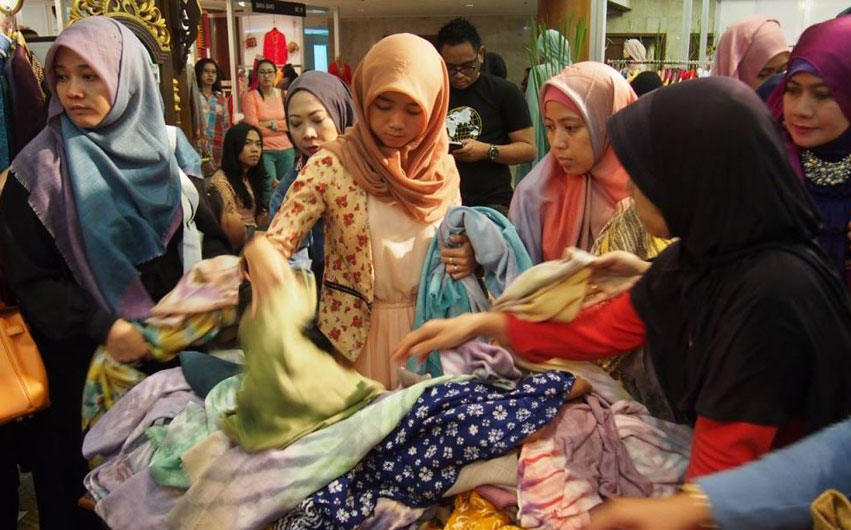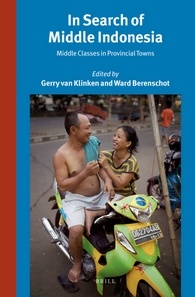
A Netherlands-Indonesia research program ‘In search of Middle Indonesia’ is a wide-ranging attempt to relocate the focus of the social science research agenda on Indonesia, away from the ‘commanding heights’ of society, the state and the economy, to the underestimated middle reaches.
For a long time neglected, Middle Indonesia represents the geographical space between village and metropolitan city, the social space between the established upper-middle classes and the urban poor, the economic and political twilight zone between formal institutions and markets (and between informal and illegal arrangements), the cultural meeting ground of global fashions and localized practices, and the generational space between child and adult. Nearly a quarter of the population lives in provincial urbanizing areas, but despite their growing size and increasing importance our knowledge about these groups and the spaces they inhabit remains limited.
The political and administrative changes since 1998 (democratization and decentralization) have brought into view this neglected social zone. In light of these fundamental changes we expect this zone to become even more significant in coming years. The intermediate classes who inhabit Middle Indonesia have become important social actors. Seizing in dramatic ways on the successful development of electoral democracy in the last five years, it is they, and particularly the youth among them, who have taken to the streets. Defying their prior assignment under the New Order regime to the depoliticized ‘floating mass’, they have become the new constituencies of political parties.
A considerable number of studies exist on elites in Indonesia’s big cities, and there is a long scholarly tradition of study on the urban and rural poor. Now it is time to study the middle ground, because of its renewed significance. Middle Indonesia challenges the heuristic assumption that the middle is a merely transitional battle zone between the upper and the lower. We view Middle Indonesia as an ambivalent zone, in between different worlds, but it is not transitional or merely a transfer point. Middle Indonesia has a reality of its own that deserves careful scrutiny. In important senses, Indonesia’s future is decided here.
The groundwork for a study of Middle Indonesia has been laid in the KNAW-funded research programs ‘Indonesia in Transition’ and the KITLV program ‘Renegotiating Boundaries’. We now need to know what Middle Indonesia is – beyond its ‘in-between’ character as intimated above – and how it works. We do this by focusing on the intermediate classes. In between better off middle class executives and officials on the one hand, and wage laborers and the rural poor on the other, they consist of the self-employed and the lower echelons of officialdom. To see where the intermediate classes are going, we focus on youth as the dynamic element. In other words, youth and the intermediate classes should not be seen as two separate categories. Instead, youth constitute a motor of change within the intermediate classes.
We look at the intermediate classes not merely as an income category, but are interested in their social and political potential: How are their aspirations formed? What is their political makeup? How do they express their identities? What can this tell us about the role of Middle Indonesia in coming years?
The setting for our study on the intermediate classes is the provincial town. Over the last decades Indonesia has experienced a rapid process of de-agrarianization, as a result of which about a quarter of the population lives in such intermediate towns. While some studies have been conducted on metropoles and provincial capitals, these medium sized towns have been neglected. Especially since regional autonomy has been set in motion, these places have become more important as administrative and economic nodes in the post-Suharto Indonesian landscape. The program comprises a number of inter-related projects.
‘In Search of Middle Indonesia’ is a joint Netherlands-Indonesia research consortium, funded through a grant from the Royal Netherlands Academy of Sciences (KNAW) under its SPIN program (Indonesia-Netherlands Cooperation Program). The KITLV acts as secretary and is also making a substantial contribution in the form of postdoctoral fellowships. The main institutional participant in Indonesia is the Faculty of Social and Political Sciences at Gadjah Mada University, Jogjakarta, through Prof. dr. Mohtar Mas’oed and Dr. Pratikno. Dutch participating institutions are the Institute of Social Studies in the Hague (ISS), the Amsterdam School for Social Science Research at the University of Amsterdam (ASSR-UvA), the Department of Cultural Anthropology and Development Sociology, Faculty of Social Sciences, Leiden University, and KITLV. The program runs from 2006 to 2010 and will result in a significant number of publications.
‘In Search of Middle Indonesia’ is a joint Netherlands-Indonesia research consortium, funded through a grant from the Royal Netherlands Academy of Sciences (KNAW) under its SPIN program (Indonesia-Netherlands Cooperation Program). The KITLV acts as secretary and is also making a substantial contribution in the form of postdoctoral fellowships. The main institutional participant in Indonesia is the Faculty of Social and Political Sciences at Gadjah Mada University, Jogjakarta, through Prof. dr. Mohtar Mas’oed and Dr. Pratikno. Dutch participating institutions are the Institute of Social Studies in the Hague (ISS), the Amsterdam School for Social Science Research at the University of Amsterdam (ASSR-UvA), the Department of Cultural Anthropology and Development Sociology, Faculty of Social Sciences, Leiden University, and KITLV. The program runs from 2006 to 2010 and will result in a significant number of publications.
Click here for the list of selected publications resulting from the project (in PDF).
COMPLETED PROJECTS
Click here to go back to the full list of research projects completed at the KITLV/Royal Netherlands Institute of Southeast Asian and Caribbean Studies and in collaboration with other departments and institutions.
2006-2014
Gerry van Klinken (coordinator)
Click here for an overview of all the other researchers related to this project, including summaries of their (PhD and postdoctoral) subprojects (in PDF).





